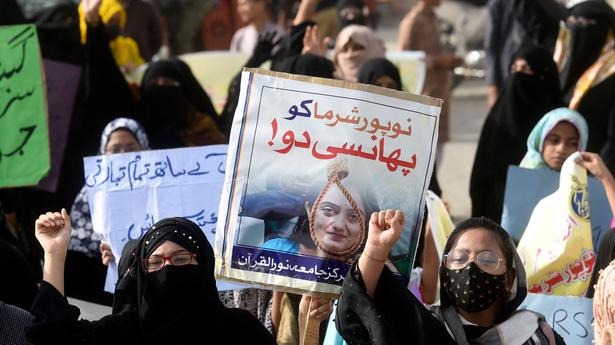
India monitors security of its mission in Pakistan
The Hindu
New Delhi protests attack on Karachi temple
India is “monitoring” the security situation for its High Commission in Islamabad in the wake of the controversy over comments on Prophet Mohammed, sources said, as groups in Pakistan called for protest marches in several cities to take place on Friday. According to the Ministry of External Affairs, New Delhi has also called on the Pakistani government to ensure the safety of minorities, sending a formal protest about the attack on a Hindu temple in Karachi’s Korangi area.
“We’ve noted a recent incident of vandalisation of a Hindu temple in Karachi. We believe it’s another act of systemic persecution of religious minorities,” said MEA spokesperson Arindam Bagchi at the weekly media briefing on Thursday. “We’ve conveyed our protest to the Pakistan government, urging them to ensure safety, security & well-being of its minority communities.”
The MEA did not comment on reports that the government has asked for more protection for the mission, although officials said security arrangements are assessed from time to time, and revised if necessary. On Thursday, dozens of protesters clashed with police in the high-security diplomatic or “green zone” of the Pakistani capital, indicating that more are expected to follow on Friday. Groups like the Ulema Council, Jamaat-e-Islami and the Tehreek-e-Labaik plan to protest outside the High Commission in Islamabad after Friday prayers, and also in the Pakistani cities of Hyderabad, Karachi, Lahore, Multan, Muzaffarabad, Peshawar, Quetta, Rawalpindi and Sargodha, Pakistan media reported.
Concerns have also grown for the safety of the minority community in Pakistan as the vandalisation of a temple by a group of about six people is seen as connected to the remarks made by two BJP spokespersons.
Despite the action, Pakistan’s leadership has continued to call for the protests, and members of the Pakistani Senate are expected to lead a rally outside the Indian High Commission on Friday. Earlier this week, Pakistan’s National Assembly and Senate passed resolutions condemning the comments made in India, unanimously. The resolutions blamed the Modi government for what it called “Islamophobia” in India, and called for intervention by the United Nations. Former Pakistani Prime Minister Imran Khan addressed a rally demanding the Pakistan government sever ties with India and boycott Indian products. Since 2019, India and Pakistan have downgraded the relationship, and cut off trading ties, with only some Indian pharmaceutical goods being allowed into Pakistan as an exception. India had on Sunday rejected comments made by the Pakistani government and Prime Minister Shehbaz Sharif, calling Pakistan a “serial violator” of minority rights.
Officials say they hope that apart from Pakistan, other OIC countries that had strongly protested the comments in India would accept India’s stand that the comments were not connected to the government and sufficient action has been taken against the spokespersons. Visiting Delhi this week, Iranian Foreign Minister Hossein Amir Abdollahian had said in a statement that Iran was “satisfied” with his conversations with Indian officials and tweeted that “Tehran & New Delhi agree on the need to respect divine religions & Islamic sanctities & to avoid divisive statements.” When asked about the comments by the Iranian side, the MEA spokesperson said that the issue of the comments had not come up in Mr. Abdollahian’s meeting with External Affairs Minister S. Jaishankar on Wednesday, but would not comment on talks with National Security Adviser Ajit Doval.
A statement issued by the Iran Ministry of Foreign Affairs had quoted Mr. Doval as having said that the people responsible for the offending comments had been “dealt with in such a way that others will learn a lesson”. While Iran did not retract the statement, it was taken down from the Ministry of Foreign Affairs official Farsi and English websites.

“Writing, in general, is a very solitary process,” says Yauvanika Chopra, Associate Director at The New India Foundation (NIF), which, earlier this year, announced the 12th edition of its NIF Book Fellowships for research and scholarship about Indian history after Independence. While authors, in general, are built for it, it can still get very lonely, says Chopra, pointing out that the fellowship’s community support is as valuable as the monetary benefits it offers. “There is a solid community of NIF fellows, trustees, language experts, jury members, all of whom are incredibly competent,” she says. “They really help make authors feel supported from manuscript to publication, so you never feel like you’re struggling through isolation.”

Several principals of government and private schools in Delhi on Tuesday said the Directorate of Education (DoE) circular from a day earlier, directing schools to conduct classes in ‘hybrid’ mode, had caused confusion regarding day-to-day operations as they did not know how many students would return to school from Wednesday and how would teachers instruct in two modes — online and in person — at once. The DoE circular on Monday had also stated that the option to “exercise online mode of education, wherever available, shall vest with the students and their guardians”. Several schoolteachers also expressed confusion regarding the DoE order. A government schoolteacher said he was unsure of how to cope with the resumption of physical classes, given that the order directing government offices to ensure that 50% of the employees work from home is still in place. On Monday, the Commission for Air Quality Management in the National Capital Region and Adjoining Areas (CAQM) had, on the orders of the Supreme Court, directed schools in Delhi-NCR to shift classes to the hybrid mode, following which the DoE had issued the circular. The court had urged the Centre’s pollution watchdog to consider restarting physical classes due to many students missing out on the mid-day meals and lacking the necessary means to attend classes online. The CAQM had, on November 20, asked schools in Delhi-NCR to shift to the online mode of teaching.









